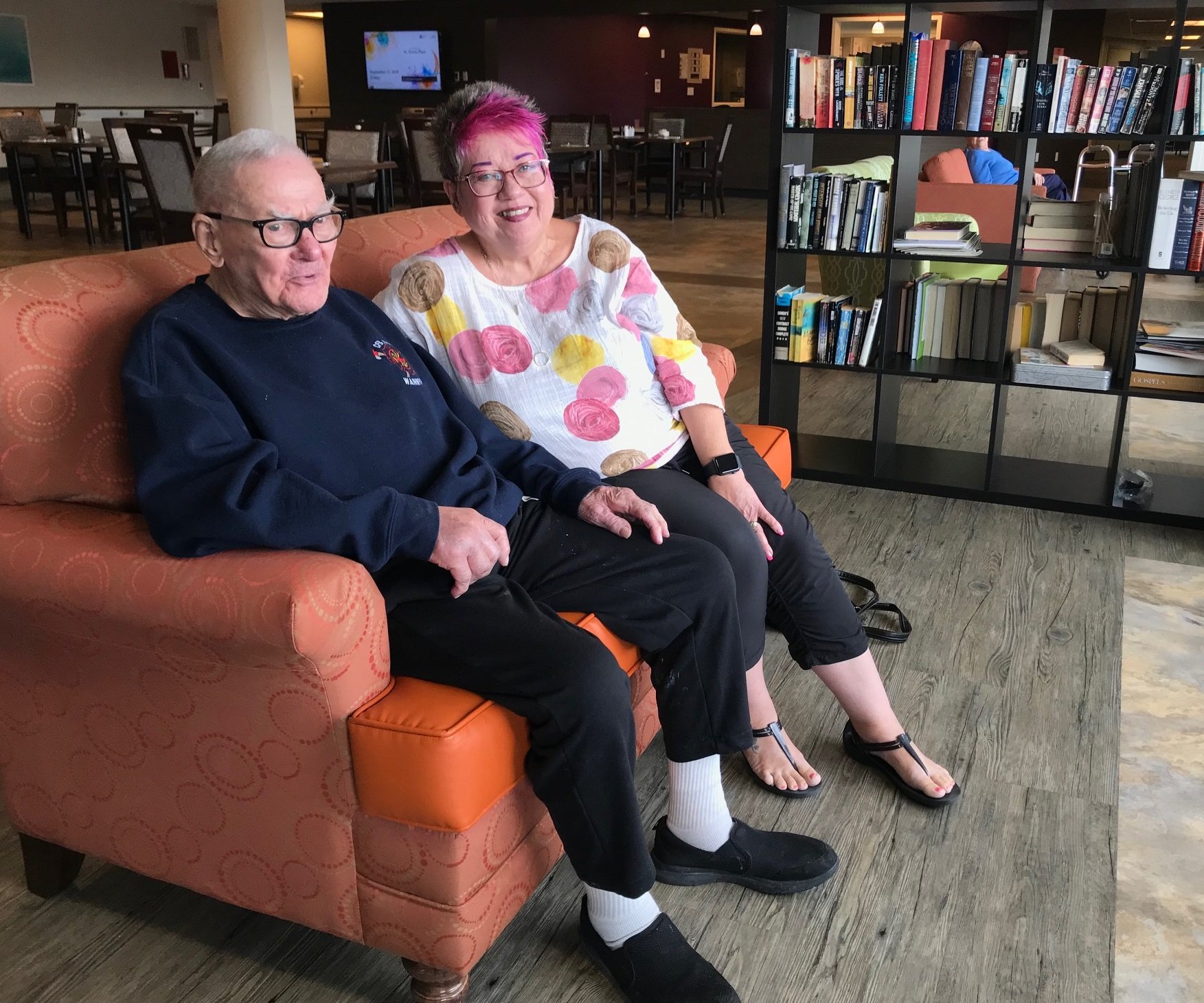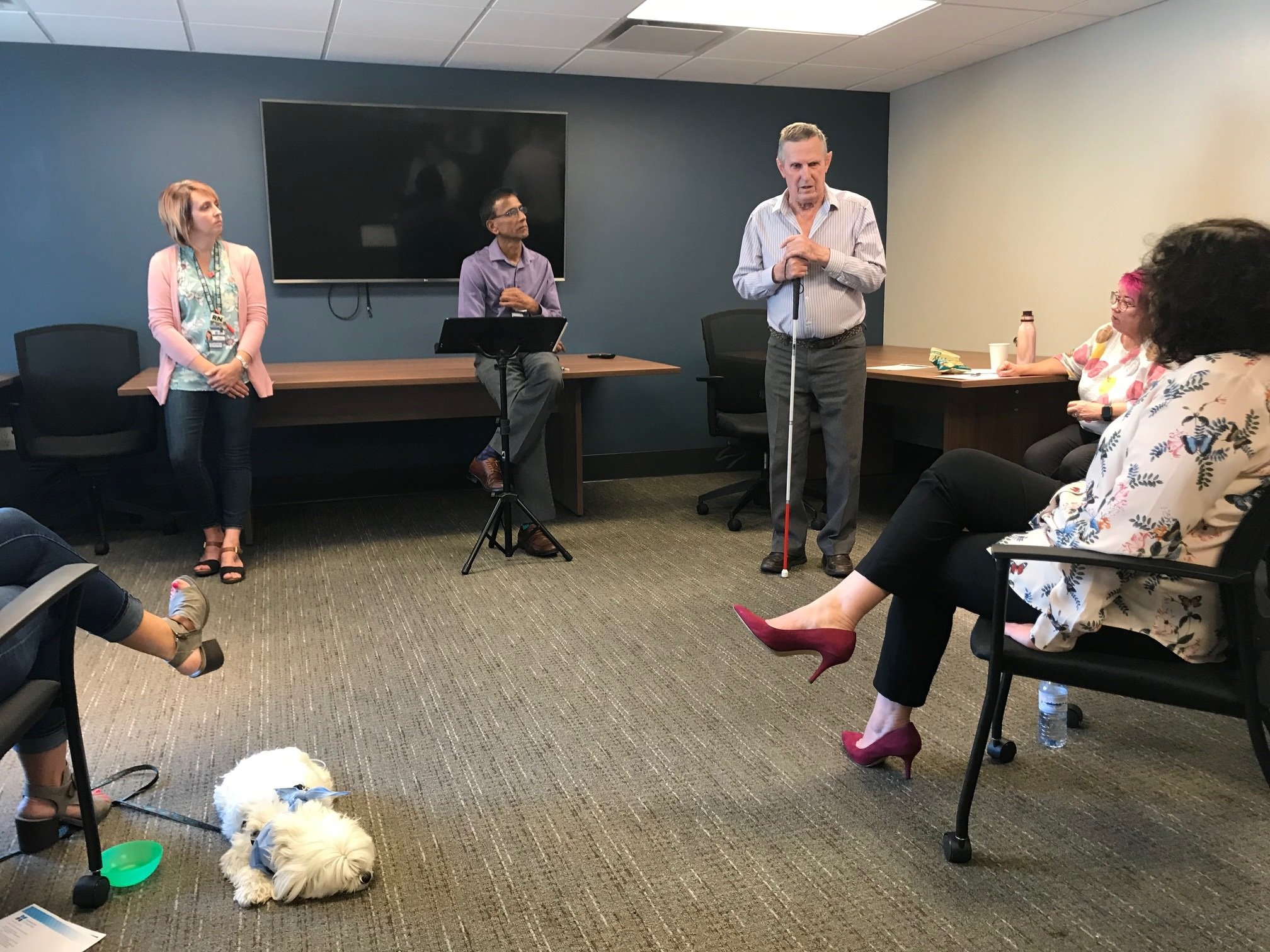Navigating the dementia journey
Group provides loved ones with education and support
October 16, 2019
By Brenton Driedger, Social Media and Storytelling Advisor, Covenant Health
Sharon Falconer enjoys sitting with her dad, Jim Doyle, and watching nearby construction through the window.

Jim, 89, has Alzheimer’s disease and moved into St. Teresa Place in Calgary nearly two years ago. He makes comments as he observes a new church being built and Sharon has learned to go along with them.
“He says, ‘That big cross, it’s for the airplanes, so the airplanes don’t crash into us.’ It’s not funny, but it is,” says Sharon, who learned after her dad’s diagnosis that it’s best not to argue with or correct someone who has Alzheimer’s. “You’re not going to win. So I just go, ‘Really? I didn’t know that.’”
Sharon has learned much about dementia since her father’s diagnosis in 2016, and the progression of the illness can be overwhelming. She’s one of about 25 people who attend a monthly support group at St. Teresa Place for family members of residents living with dementia. The sessions include education about dementia and allow participants to ask questions and share their experiences.
“It’s helpful to know you’re not the only one, that there are people out there just like you, in the same position,” says Ted Bartsch, who also attends the support meetings.

Ted and his wife, Anna, 81, moved into St. Teresa Place around the same time as Jim. Anna was diagnosed with Alzheimer’s about two years earlier, and for a long time, Ted did his best to care for her and maintain their home.
“It just got to where I couldn’t handle doing the cooking. The smoke alarm became the dinner bell.”
Having Anna live at St. Teresa Place means Ted can focus on being a companion to his wife of 61 years instead of her caregiver. But it’s still hard. Ted has vision loss and used to depend on Anna to read to him. In addition to Alzheimer’s, Anna had a stroke. Now she struggles to read or hold a conversation.
“I just miss the old Anna,” he says. “You just don’t really understand it until you’re there, how heartbreaking it can be.”
Support group members can share personal experiences and emotions in the meetings, run by Registered Nurse Kera Redlack, Chaplain Paras Persad and Recreation Therapist Stephanie Rodgers.
“People often come to the group and say, ‘Oh my gosh, I thought I was the only one,’” says Kera. “I can Google ‘signs of dementia’ but I can’t necessarily find another person whose mom also accuses their care staff of stealing every day. And so I don’t know that that’s a normal sign of dementia until I go to a forum where everybody is experiencing that same thing.”
Paras says many family members struggle with grief and guilt. They are balancing careers, family and other commitments, and some drive long distances to visit their loved one. They can question their decision to place a family member in care or feel like they have abandoned their loved one. Sharing those experiences helps them process their feelings.
“We provide a forum where people can feel heard, understood, and be with other people who get it,” says Paras. “And the same people who lead the support group are the same people who are involved with their parents. That’s a huge carryover.
“We can understand where that daughter or son is coming from. And that gives us a lot more context to care for the resident.”
Sharon says having both peer support and education resources is important.
“This group focuses things for us,” she says. “We’re all together and we’re listening to each other’s stories and going, ‘Oh, I ran into that.’ Or, ‘Oh, I’ve got information about that.’ And it’s a really good resource for us.”
For Ted, the group can also be a safe outlet. He finds it hard not to argue with Anna. He says she complains of phantom pains up to 30 times a day. Now that they live at St. Teresa Place, he can suggest Anna talk to a nurse and he can share his frustrations with the support group.
During the meetings, staff share practical suggestions for interacting with loved ones, from meaningful activities during visits to useful Christmas gift ideas to strategies for coping with behaviours. One participant’s mother would call her several times a day, including in the middle of the night, to ask her when she was coming to visit. Kera encouraged the woman to get a dedicated phone line for her mother to call anytime and record a greeting that would tell her mom she loved her and remind her which days she comes for scheduled visits. It reassured the mother and helped her daughter set healthy boundaries.
“A lot of times, the resident who calls is just looking for that check-in, that touch base. They’ve kind of lost track of that sense of time and day, so they want that reminder that somebody loves me, somebody cares about me, and they’re coming to see me at these times.”
Sharon and her partner visit her dad at least twice a week. The former firefighter for the Royal Canadian Air Force has lost the ability to do many of the things he used to do. He doesn’t remember his friends and siblings and he forgets that he used to go south for the winter.
“Watching him lose his faculties, that’s the hardest part,” says Sharon. “Because Dad’s my hero.”
But she says she’s learned to be grateful for the good moments like laughing at her dad’s construction commentary.
“Some days, it’s horrible. And some days, it’s a blast. I need to know that I’m not the only one in the world that’s going through this.”